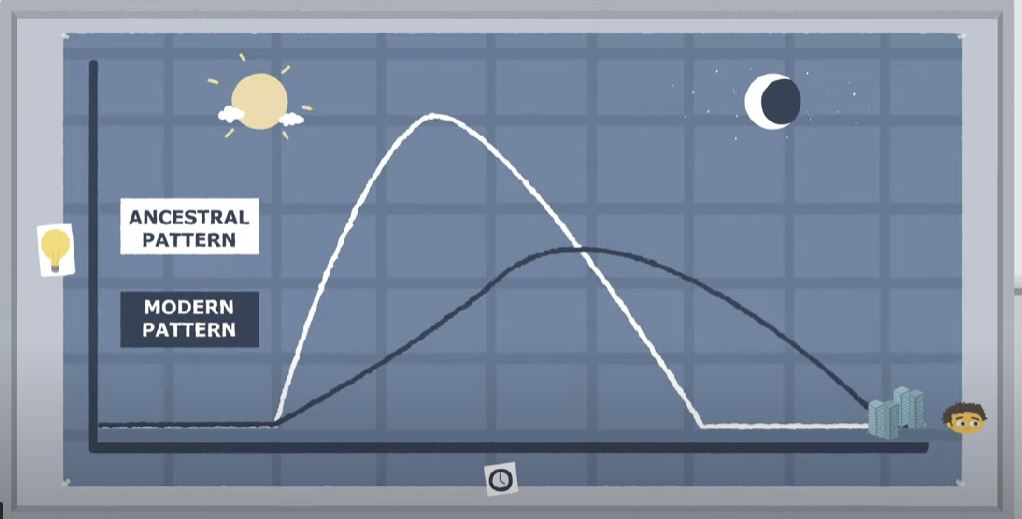Why Do We Sleep So Late
Have you ever found yourself wondering why day after day you’re awoken by your alarm clock, still feeling tired? It’s likely you are procrastinating going to bed because your natural circadian rhythm is delayed by your light consumption behaviour.
University of Surrey colleagues Prof. Dr. Anne Skeldon from the Department of Mathematics along with Prof. Dr. Derk-Jan Dijk from the Surrey Sleep Research Centre, recently released a short animated film discussing light, circadian rhythms and sleep. The film was produced in collaboration with director / animator, Peter Caires.
The short film explains the underlying science behind the interaction between light, our internal biological clocks and sleep timing. Although organisms (humans, animals and plants alike) all have their own internal circadian rhythms to keep time, light is key to keeping those internal approximately 24-hour circadian rhythms aligned to the 24-hour day. Too little light at the right time or too much light at the wrong time, results in delayed bedtimes and not enough time for us to get adequate sleep before the alarm goes off. There are even mathematical models that can quantify the delay and resulting loss of sleep (Skeldon et al., 2017).
The effects of light on circadian timing underlie the recent guidance for light exposure patterns to best support physiology, sleep and wakefulness. These recommendations are that (1) light should be bright during the day (ideally natural daylight), (2) turned down to low levels at least 3 hours before bedtime and (3) that the sleep environment should be as dark as possible. (Brown et al, 2022).
References
- Skeldon, Philllips & Dijk. (2017). The effects of self-selected light-dark cycles and social constraints on human sleep and circadian timing: a modeling approach. Sci Rep.
- Brown et al (2022). Recommendations for daytime, evening, and nighttime indoor light exposure to best support physiology, sleep, and wakefulness in healthy adults. PLOS Biology.
Reminders
Apply for Research Grants
The ESRS has recently launched a grant in support of Ukrainians leaving Ukraine due to the conflict. This research grant is for a 3-month study stay aimed at sleep researchers, investigators, scientists and clinicians.
Applications will be accepted on a rolling basis.
More details here.
The ESRS supported by our corporate member Bioprojet, is offering a 10.000 € grant to support a young physician working in the field of daytime sleepiness. The grant should support an ongoing or new research project and should be completed within three years.
Application Deadline: 24 June 2022
More details her
Recent publications from ESRS members
- Sarkanen et al. (2022). Misdiagnosis of narcolepsy caused by a false positive orexin-A/hypocretin-1 enzyme immune assay. J Clin Sleep Med.
- Liu et al. (2022). Dream-enactment behaviours during the COVID-19 pandemic: an international COVID-19 sleep study. J Sleep Res.
- Peltonen et al. (2022). Sleep disturbances and depressive and anxiety symptoms during pregnancy: associations with delivery and newborn health. Arch Gynecol Obstet.
- Holm et al. (2022). The evolutionarily conserved miRNA-137 targets the neuropeptide hypocretin/orexin and modulates the wake to sleep ratio. Proc Natl Acad Sci U S A.




